Nike Inc. Financial Statement Analysis: Performance & Market Impact
VerifiedAdded on 2023/06/13
|11
|3323
|282
Report
AI Summary
This report provides a financial statement analysis of Nike Inc., examining its role in the international market, its competitors, and the current market conditions impacting its financial statements. The analysis covers a five-year performance period, utilizing ratio analysis to assess the company's activity, liquidity, solvency, and profitability. Key findings include trends in revenue, expenditure, and various financial ratios such as inventory processing period, receivables collection period, current ratio, debt-to-equity ratio, and profitability ratios. The report also discusses the impact of internal issues and external market factors on Nike's financial performance, offering insights into the company's strengths and weaknesses. Desklib provides this and many other solved assignments for students.
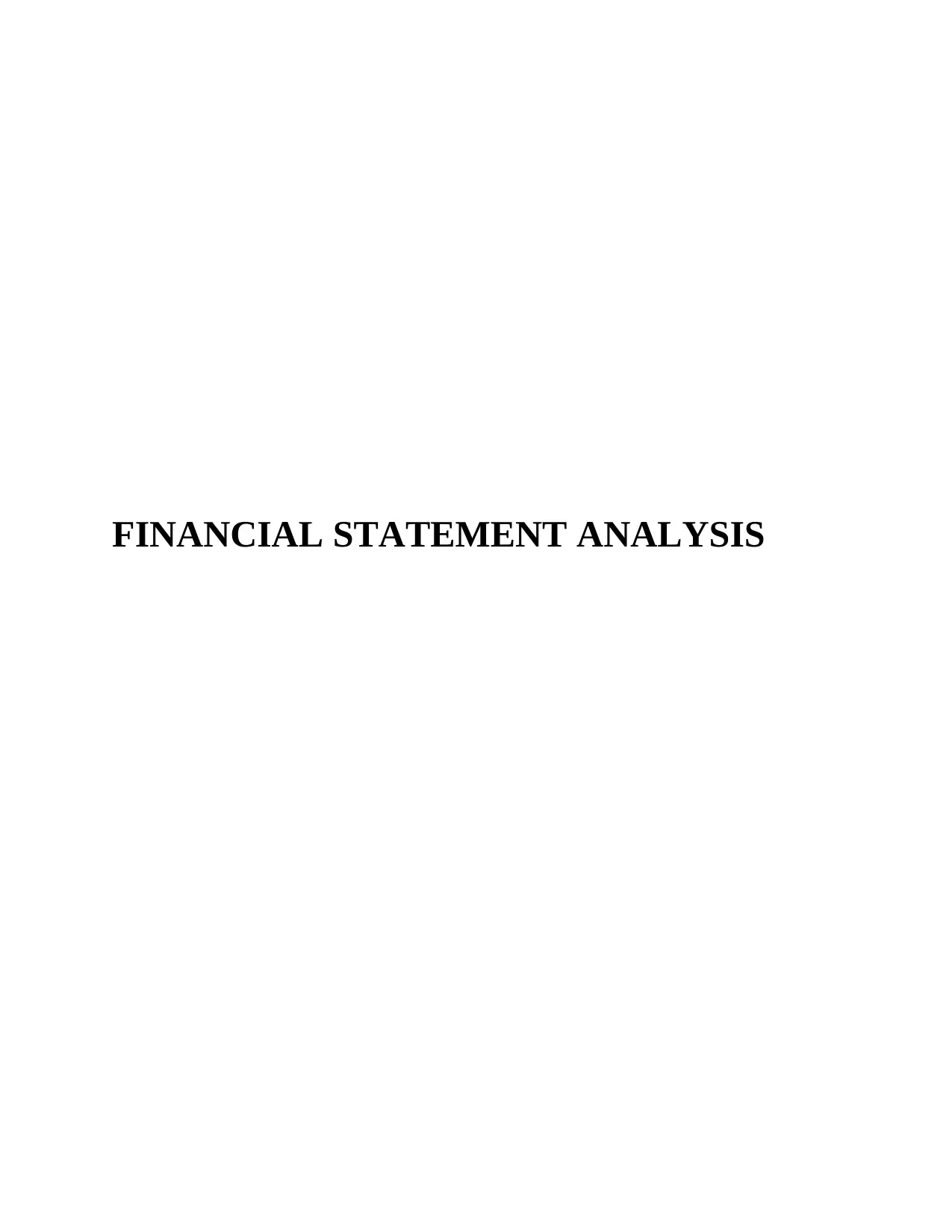
FINANCIAL STATEMENT ANALYSIS
Paraphrase This Document
Need a fresh take? Get an instant paraphrase of this document with our AI Paraphraser
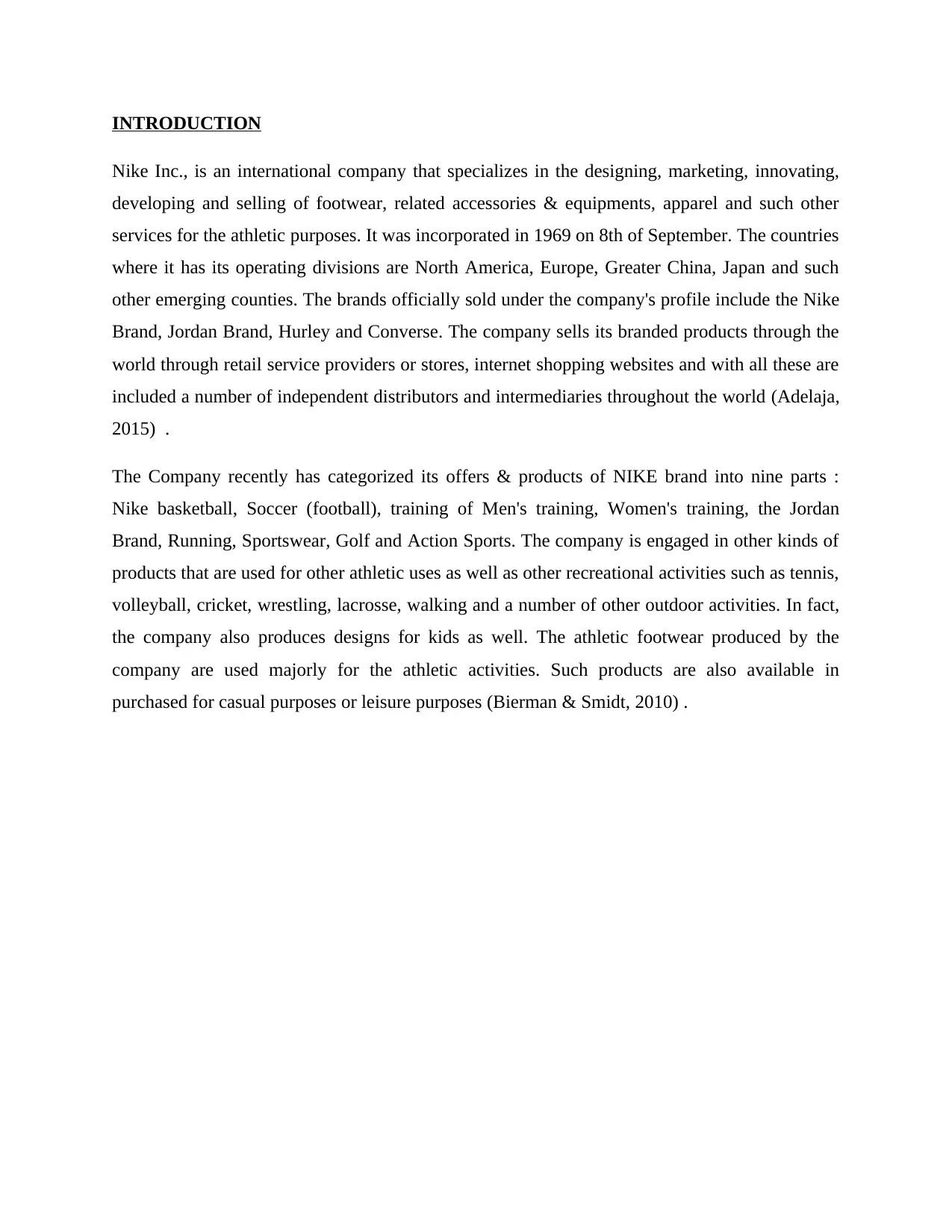
INTRODUCTION
Nike Inc., is an international company that specializes in the designing, marketing, innovating,
developing and selling of footwear, related accessories & equipments, apparel and such other
services for the athletic purposes. It was incorporated in 1969 on 8th of September. The countries
where it has its operating divisions are North America, Europe, Greater China, Japan and such
other emerging counties. The brands officially sold under the company's profile include the Nike
Brand, Jordan Brand, Hurley and Converse. The company sells its branded products through the
world through retail service providers or stores, internet shopping websites and with all these are
included a number of independent distributors and intermediaries throughout the world (Adelaja,
2015) .
The Company recently has categorized its offers & products of NIKE brand into nine parts :
Nike basketball, Soccer (football), training of Men's training, Women's training, the Jordan
Brand, Running, Sportswear, Golf and Action Sports. The company is engaged in other kinds of
products that are used for other athletic uses as well as other recreational activities such as tennis,
volleyball, cricket, wrestling, lacrosse, walking and a number of other outdoor activities. In fact,
the company also produces designs for kids as well. The athletic footwear produced by the
company are used majorly for the athletic activities. Such products are also available in
purchased for casual purposes or leisure purposes (Bierman & Smidt, 2010) .
Nike Inc., is an international company that specializes in the designing, marketing, innovating,
developing and selling of footwear, related accessories & equipments, apparel and such other
services for the athletic purposes. It was incorporated in 1969 on 8th of September. The countries
where it has its operating divisions are North America, Europe, Greater China, Japan and such
other emerging counties. The brands officially sold under the company's profile include the Nike
Brand, Jordan Brand, Hurley and Converse. The company sells its branded products through the
world through retail service providers or stores, internet shopping websites and with all these are
included a number of independent distributors and intermediaries throughout the world (Adelaja,
2015) .
The Company recently has categorized its offers & products of NIKE brand into nine parts :
Nike basketball, Soccer (football), training of Men's training, Women's training, the Jordan
Brand, Running, Sportswear, Golf and Action Sports. The company is engaged in other kinds of
products that are used for other athletic uses as well as other recreational activities such as tennis,
volleyball, cricket, wrestling, lacrosse, walking and a number of other outdoor activities. In fact,
the company also produces designs for kids as well. The athletic footwear produced by the
company are used majorly for the athletic activities. Such products are also available in
purchased for casual purposes or leisure purposes (Bierman & Smidt, 2010) .
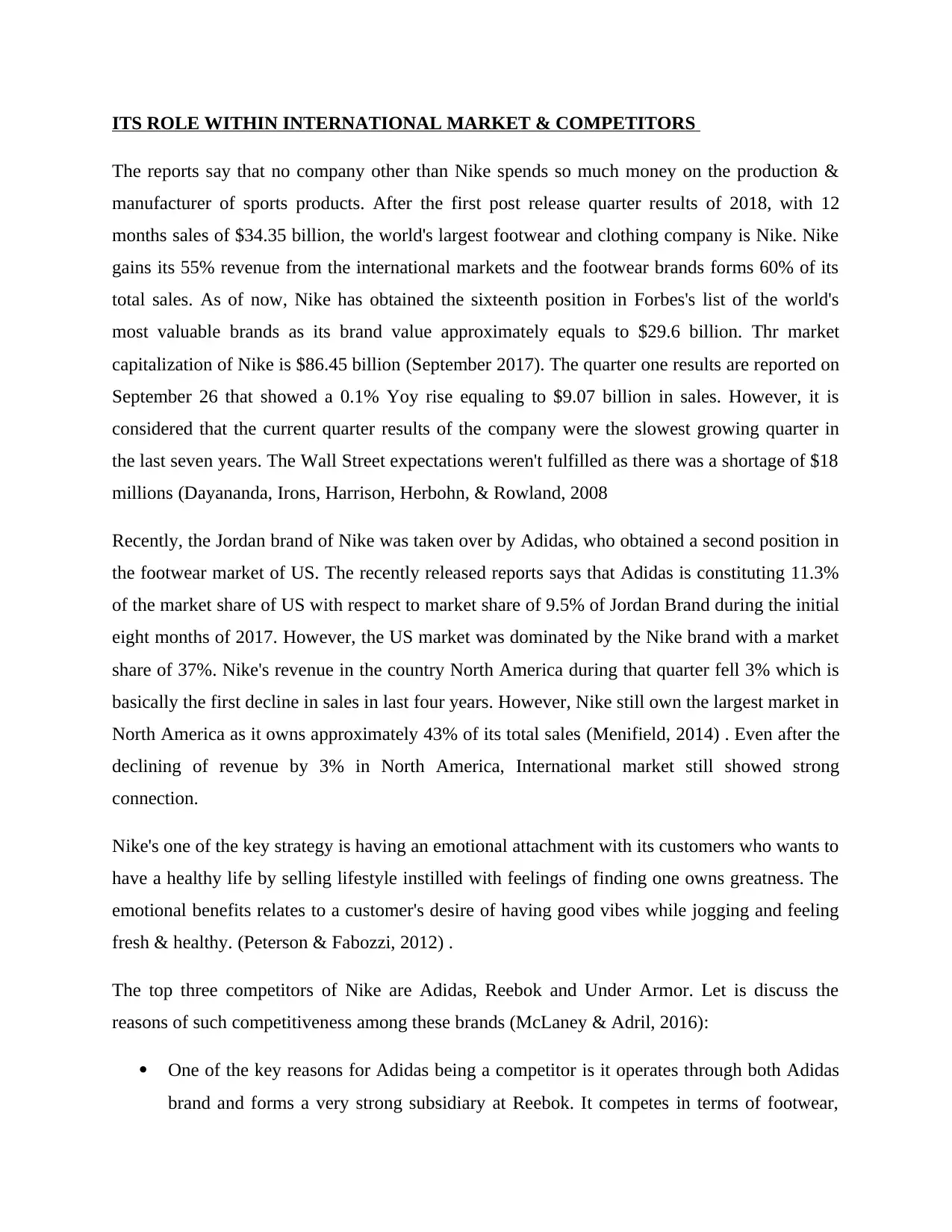
ITS ROLE WITHIN INTERNATIONAL MARKET & COMPETITORS
The reports say that no company other than Nike spends so much money on the production &
manufacturer of sports products. After the first post release quarter results of 2018, with 12
months sales of $34.35 billion, the world's largest footwear and clothing company is Nike. Nike
gains its 55% revenue from the international markets and the footwear brands forms 60% of its
total sales. As of now, Nike has obtained the sixteenth position in Forbes's list of the world's
most valuable brands as its brand value approximately equals to $29.6 billion. Thr market
capitalization of Nike is $86.45 billion (September 2017). The quarter one results are reported on
September 26 that showed a 0.1% Yoy rise equaling to $9.07 billion in sales. However, it is
considered that the current quarter results of the company were the slowest growing quarter in
the last seven years. The Wall Street expectations weren't fulfilled as there was a shortage of $18
millions (Dayananda, Irons, Harrison, Herbohn, & Rowland, 2008
Recently, the Jordan brand of Nike was taken over by Adidas, who obtained a second position in
the footwear market of US. The recently released reports says that Adidas is constituting 11.3%
of the market share of US with respect to market share of 9.5% of Jordan Brand during the initial
eight months of 2017. However, the US market was dominated by the Nike brand with a market
share of 37%. Nike's revenue in the country North America during that quarter fell 3% which is
basically the first decline in sales in last four years. However, Nike still own the largest market in
North America as it owns approximately 43% of its total sales (Menifield, 2014) . Even after the
declining of revenue by 3% in North America, International market still showed strong
connection.
Nike's one of the key strategy is having an emotional attachment with its customers who wants to
have a healthy life by selling lifestyle instilled with feelings of finding one owns greatness. The
emotional benefits relates to a customer's desire of having good vibes while jogging and feeling
fresh & healthy. (Peterson & Fabozzi, 2012) .
The top three competitors of Nike are Adidas, Reebok and Under Armor. Let is discuss the
reasons of such competitiveness among these brands (McLaney & Adril, 2016):
One of the key reasons for Adidas being a competitor is it operates through both Adidas
brand and forms a very strong subsidiary at Reebok. It competes in terms of footwear,
The reports say that no company other than Nike spends so much money on the production &
manufacturer of sports products. After the first post release quarter results of 2018, with 12
months sales of $34.35 billion, the world's largest footwear and clothing company is Nike. Nike
gains its 55% revenue from the international markets and the footwear brands forms 60% of its
total sales. As of now, Nike has obtained the sixteenth position in Forbes's list of the world's
most valuable brands as its brand value approximately equals to $29.6 billion. Thr market
capitalization of Nike is $86.45 billion (September 2017). The quarter one results are reported on
September 26 that showed a 0.1% Yoy rise equaling to $9.07 billion in sales. However, it is
considered that the current quarter results of the company were the slowest growing quarter in
the last seven years. The Wall Street expectations weren't fulfilled as there was a shortage of $18
millions (Dayananda, Irons, Harrison, Herbohn, & Rowland, 2008
Recently, the Jordan brand of Nike was taken over by Adidas, who obtained a second position in
the footwear market of US. The recently released reports says that Adidas is constituting 11.3%
of the market share of US with respect to market share of 9.5% of Jordan Brand during the initial
eight months of 2017. However, the US market was dominated by the Nike brand with a market
share of 37%. Nike's revenue in the country North America during that quarter fell 3% which is
basically the first decline in sales in last four years. However, Nike still own the largest market in
North America as it owns approximately 43% of its total sales (Menifield, 2014) . Even after the
declining of revenue by 3% in North America, International market still showed strong
connection.
Nike's one of the key strategy is having an emotional attachment with its customers who wants to
have a healthy life by selling lifestyle instilled with feelings of finding one owns greatness. The
emotional benefits relates to a customer's desire of having good vibes while jogging and feeling
fresh & healthy. (Peterson & Fabozzi, 2012) .
The top three competitors of Nike are Adidas, Reebok and Under Armor. Let is discuss the
reasons of such competitiveness among these brands (McLaney & Adril, 2016):
One of the key reasons for Adidas being a competitor is it operates through both Adidas
brand and forms a very strong subsidiary at Reebok. It competes in terms of footwear,
⊘ This is a preview!⊘
Do you want full access?
Subscribe today to unlock all pages.

Trusted by 1+ million students worldwide
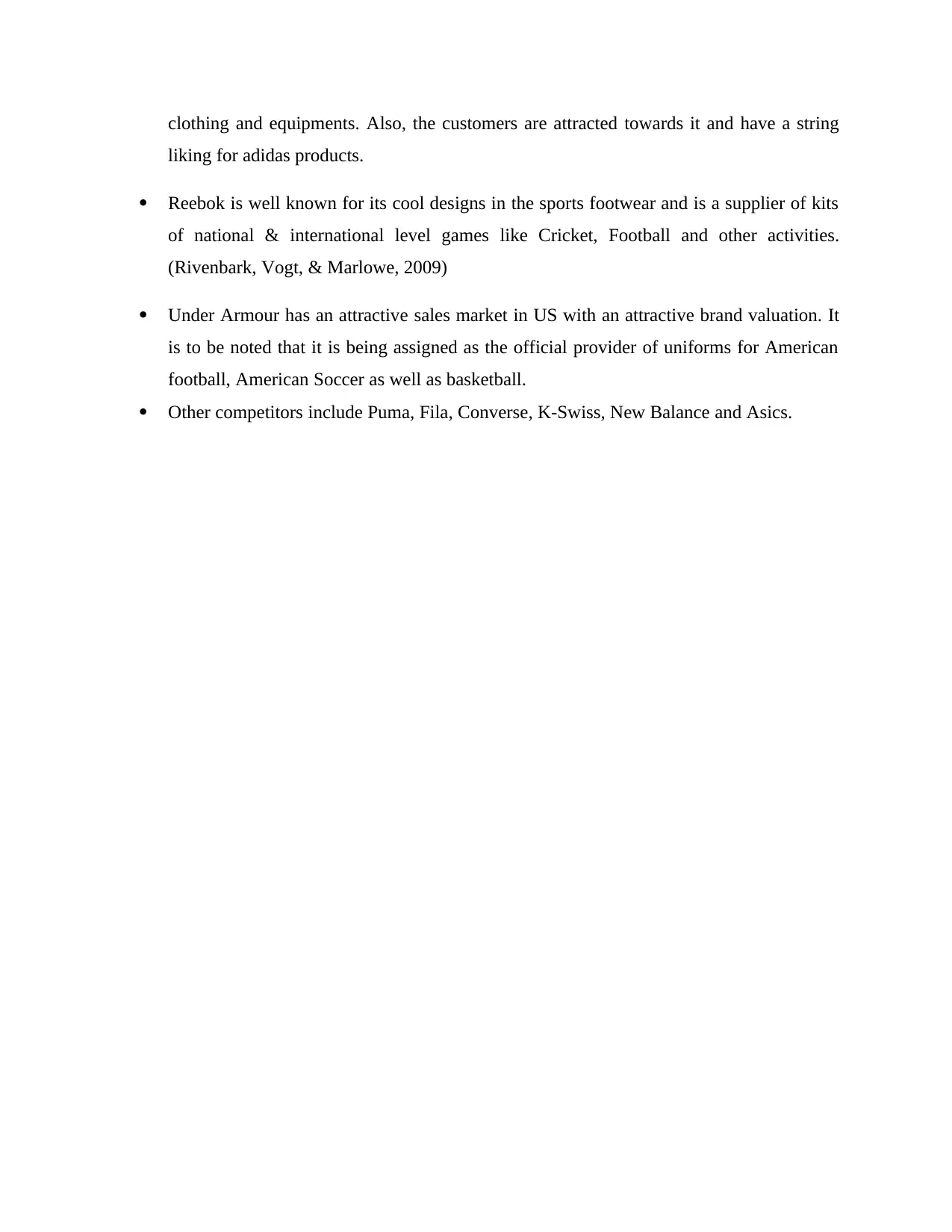
clothing and equipments. Also, the customers are attracted towards it and have a string
liking for adidas products.
Reebok is well known for its cool designs in the sports footwear and is a supplier of kits
of national & international level games like Cricket, Football and other activities.
(Rivenbark, Vogt, & Marlowe, 2009)
Under Armour has an attractive sales market in US with an attractive brand valuation. It
is to be noted that it is being assigned as the official provider of uniforms for American
football, American Soccer as well as basketball.
Other competitors include Puma, Fila, Converse, K-Swiss, New Balance and Asics.
liking for adidas products.
Reebok is well known for its cool designs in the sports footwear and is a supplier of kits
of national & international level games like Cricket, Football and other activities.
(Rivenbark, Vogt, & Marlowe, 2009)
Under Armour has an attractive sales market in US with an attractive brand valuation. It
is to be noted that it is being assigned as the official provider of uniforms for American
football, American Soccer as well as basketball.
Other competitors include Puma, Fila, Converse, K-Swiss, New Balance and Asics.
Paraphrase This Document
Need a fresh take? Get an instant paraphrase of this document with our AI Paraphraser
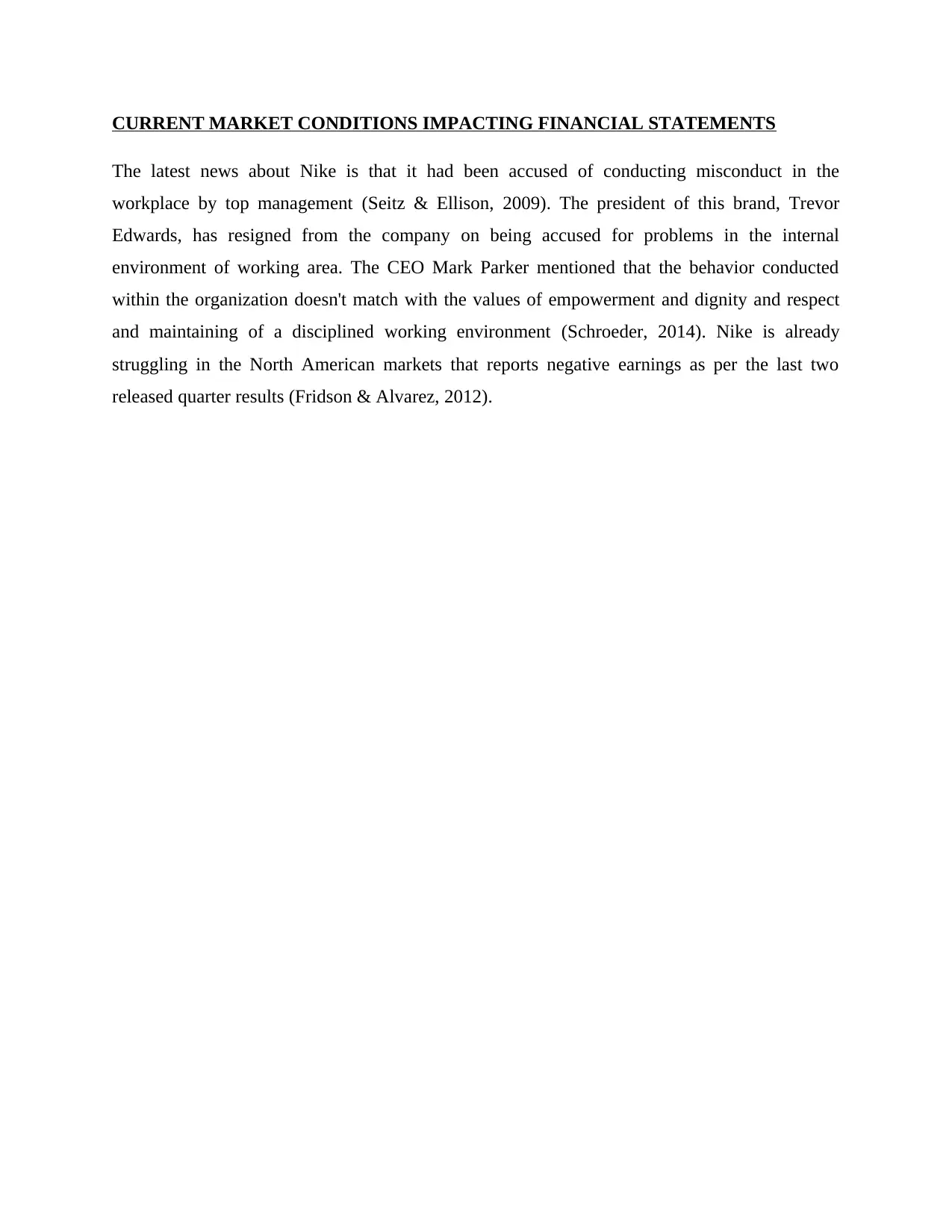
CURRENT MARKET CONDITIONS IMPACTING FINANCIAL STATEMENTS
The latest news about Nike is that it had been accused of conducting misconduct in the
workplace by top management (Seitz & Ellison, 2009). The president of this brand, Trevor
Edwards, has resigned from the company on being accused for problems in the internal
environment of working area. The CEO Mark Parker mentioned that the behavior conducted
within the organization doesn't match with the values of empowerment and dignity and respect
and maintaining of a disciplined working environment (Schroeder, 2014). Nike is already
struggling in the North American markets that reports negative earnings as per the last two
released quarter results (Fridson & Alvarez, 2012).
The latest news about Nike is that it had been accused of conducting misconduct in the
workplace by top management (Seitz & Ellison, 2009). The president of this brand, Trevor
Edwards, has resigned from the company on being accused for problems in the internal
environment of working area. The CEO Mark Parker mentioned that the behavior conducted
within the organization doesn't match with the values of empowerment and dignity and respect
and maintaining of a disciplined working environment (Schroeder, 2014). Nike is already
struggling in the North American markets that reports negative earnings as per the last two
released quarter results (Fridson & Alvarez, 2012).
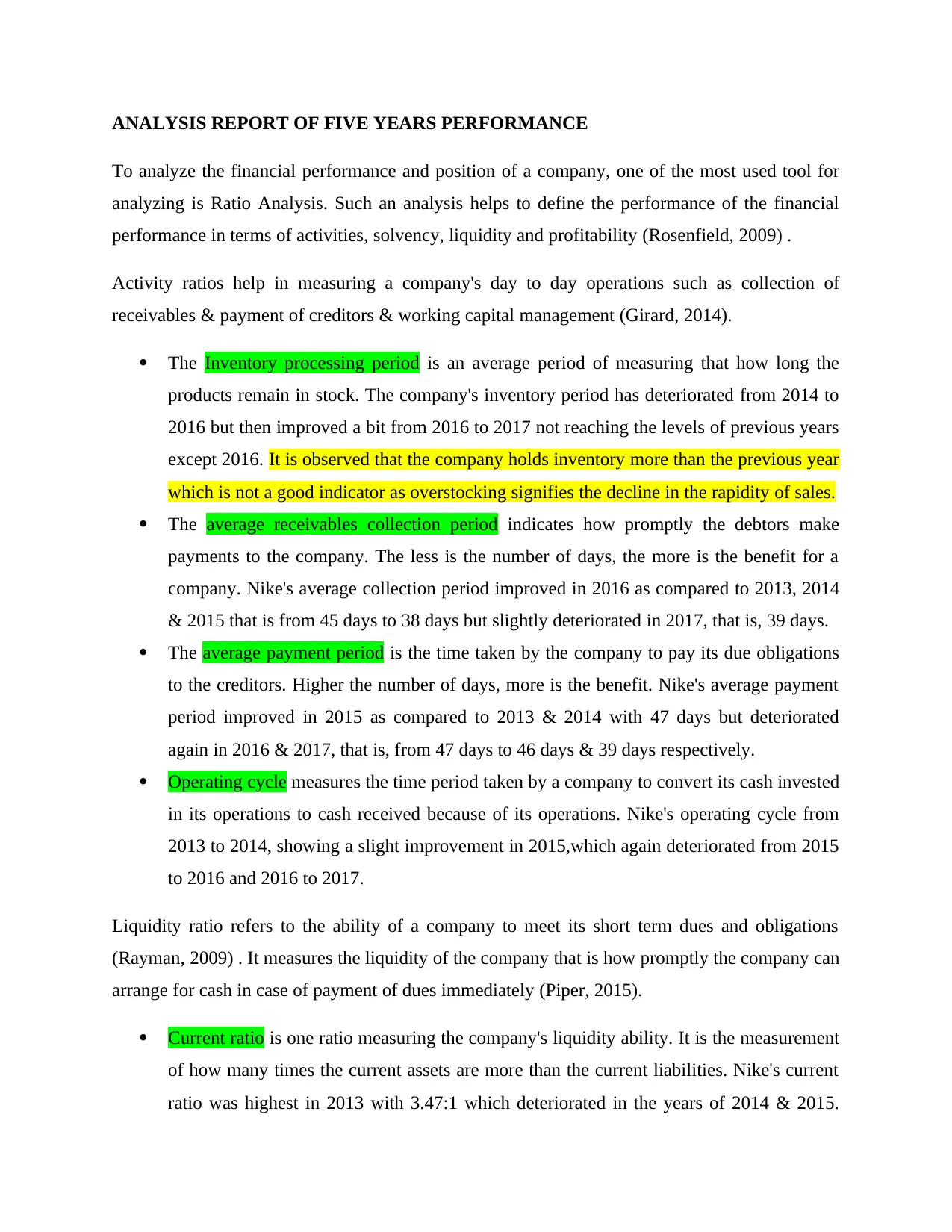
ANALYSIS REPORT OF FIVE YEARS PERFORMANCE
To analyze the financial performance and position of a company, one of the most used tool for
analyzing is Ratio Analysis. Such an analysis helps to define the performance of the financial
performance in terms of activities, solvency, liquidity and profitability (Rosenfield, 2009) .
Activity ratios help in measuring a company's day to day operations such as collection of
receivables & payment of creditors & working capital management (Girard, 2014).
The Inventory processing period is an average period of measuring that how long the
products remain in stock. The company's inventory period has deteriorated from 2014 to
2016 but then improved a bit from 2016 to 2017 not reaching the levels of previous years
except 2016. It is observed that the company holds inventory more than the previous year
which is not a good indicator as overstocking signifies the decline in the rapidity of sales.
The average receivables collection period indicates how promptly the debtors make
payments to the company. The less is the number of days, the more is the benefit for a
company. Nike's average collection period improved in 2016 as compared to 2013, 2014
& 2015 that is from 45 days to 38 days but slightly deteriorated in 2017, that is, 39 days.
The average payment period is the time taken by the company to pay its due obligations
to the creditors. Higher the number of days, more is the benefit. Nike's average payment
period improved in 2015 as compared to 2013 & 2014 with 47 days but deteriorated
again in 2016 & 2017, that is, from 47 days to 46 days & 39 days respectively.
Operating cycle measures the time period taken by a company to convert its cash invested
in its operations to cash received because of its operations. Nike's operating cycle from
2013 to 2014, showing a slight improvement in 2015,which again deteriorated from 2015
to 2016 and 2016 to 2017.
Liquidity ratio refers to the ability of a company to meet its short term dues and obligations
(Rayman, 2009) . It measures the liquidity of the company that is how promptly the company can
arrange for cash in case of payment of dues immediately (Piper, 2015).
Current ratio is one ratio measuring the company's liquidity ability. It is the measurement
of how many times the current assets are more than the current liabilities. Nike's current
ratio was highest in 2013 with 3.47:1 which deteriorated in the years of 2014 & 2015.
To analyze the financial performance and position of a company, one of the most used tool for
analyzing is Ratio Analysis. Such an analysis helps to define the performance of the financial
performance in terms of activities, solvency, liquidity and profitability (Rosenfield, 2009) .
Activity ratios help in measuring a company's day to day operations such as collection of
receivables & payment of creditors & working capital management (Girard, 2014).
The Inventory processing period is an average period of measuring that how long the
products remain in stock. The company's inventory period has deteriorated from 2014 to
2016 but then improved a bit from 2016 to 2017 not reaching the levels of previous years
except 2016. It is observed that the company holds inventory more than the previous year
which is not a good indicator as overstocking signifies the decline in the rapidity of sales.
The average receivables collection period indicates how promptly the debtors make
payments to the company. The less is the number of days, the more is the benefit for a
company. Nike's average collection period improved in 2016 as compared to 2013, 2014
& 2015 that is from 45 days to 38 days but slightly deteriorated in 2017, that is, 39 days.
The average payment period is the time taken by the company to pay its due obligations
to the creditors. Higher the number of days, more is the benefit. Nike's average payment
period improved in 2015 as compared to 2013 & 2014 with 47 days but deteriorated
again in 2016 & 2017, that is, from 47 days to 46 days & 39 days respectively.
Operating cycle measures the time period taken by a company to convert its cash invested
in its operations to cash received because of its operations. Nike's operating cycle from
2013 to 2014, showing a slight improvement in 2015,which again deteriorated from 2015
to 2016 and 2016 to 2017.
Liquidity ratio refers to the ability of a company to meet its short term dues and obligations
(Rayman, 2009) . It measures the liquidity of the company that is how promptly the company can
arrange for cash in case of payment of dues immediately (Piper, 2015).
Current ratio is one ratio measuring the company's liquidity ability. It is the measurement
of how many times the current assets are more than the current liabilities. Nike's current
ratio was highest in 2013 with 3.47:1 which deteriorated in the years of 2014 & 2015.
⊘ This is a preview!⊘
Do you want full access?
Subscribe today to unlock all pages.

Trusted by 1+ million students worldwide
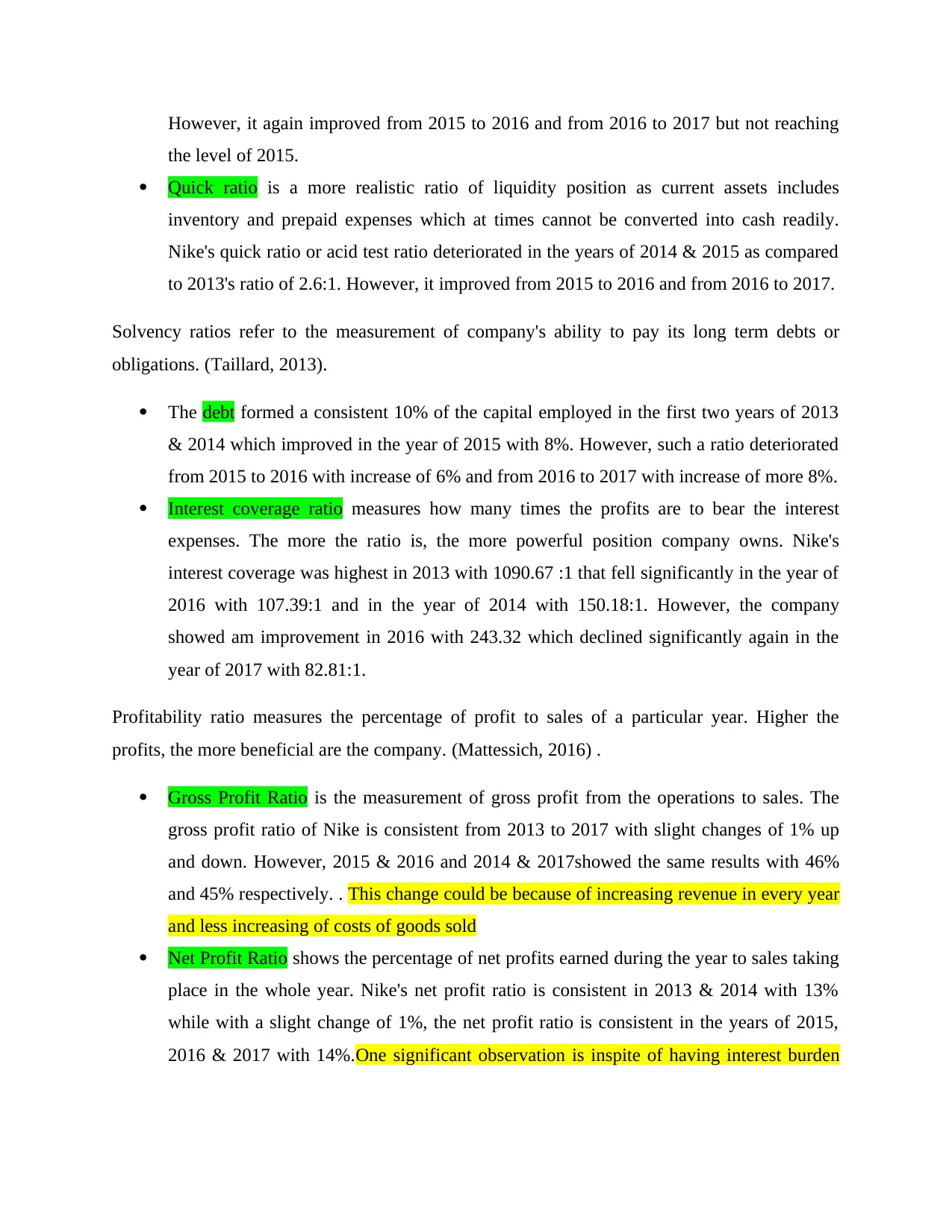
However, it again improved from 2015 to 2016 and from 2016 to 2017 but not reaching
the level of 2015.
Quick ratio is a more realistic ratio of liquidity position as current assets includes
inventory and prepaid expenses which at times cannot be converted into cash readily.
Nike's quick ratio or acid test ratio deteriorated in the years of 2014 & 2015 as compared
to 2013's ratio of 2.6:1. However, it improved from 2015 to 2016 and from 2016 to 2017.
Solvency ratios refer to the measurement of company's ability to pay its long term debts or
obligations. (Taillard, 2013).
The debt formed a consistent 10% of the capital employed in the first two years of 2013
& 2014 which improved in the year of 2015 with 8%. However, such a ratio deteriorated
from 2015 to 2016 with increase of 6% and from 2016 to 2017 with increase of more 8%.
Interest coverage ratio measures how many times the profits are to bear the interest
expenses. The more the ratio is, the more powerful position company owns. Nike's
interest coverage was highest in 2013 with 1090.67 :1 that fell significantly in the year of
2016 with 107.39:1 and in the year of 2014 with 150.18:1. However, the company
showed am improvement in 2016 with 243.32 which declined significantly again in the
year of 2017 with 82.81:1.
Profitability ratio measures the percentage of profit to sales of a particular year. Higher the
profits, the more beneficial are the company. (Mattessich, 2016) .
Gross Profit Ratio is the measurement of gross profit from the operations to sales. The
gross profit ratio of Nike is consistent from 2013 to 2017 with slight changes of 1% up
and down. However, 2015 & 2016 and 2014 & 2017showed the same results with 46%
and 45% respectively. . This change could be because of increasing revenue in every year
and less increasing of costs of goods sold
Net Profit Ratio shows the percentage of net profits earned during the year to sales taking
place in the whole year. Nike's net profit ratio is consistent in 2013 & 2014 with 13%
while with a slight change of 1%, the net profit ratio is consistent in the years of 2015,
2016 & 2017 with 14%.One significant observation is inspite of having interest burden
the level of 2015.
Quick ratio is a more realistic ratio of liquidity position as current assets includes
inventory and prepaid expenses which at times cannot be converted into cash readily.
Nike's quick ratio or acid test ratio deteriorated in the years of 2014 & 2015 as compared
to 2013's ratio of 2.6:1. However, it improved from 2015 to 2016 and from 2016 to 2017.
Solvency ratios refer to the measurement of company's ability to pay its long term debts or
obligations. (Taillard, 2013).
The debt formed a consistent 10% of the capital employed in the first two years of 2013
& 2014 which improved in the year of 2015 with 8%. However, such a ratio deteriorated
from 2015 to 2016 with increase of 6% and from 2016 to 2017 with increase of more 8%.
Interest coverage ratio measures how many times the profits are to bear the interest
expenses. The more the ratio is, the more powerful position company owns. Nike's
interest coverage was highest in 2013 with 1090.67 :1 that fell significantly in the year of
2016 with 107.39:1 and in the year of 2014 with 150.18:1. However, the company
showed am improvement in 2016 with 243.32 which declined significantly again in the
year of 2017 with 82.81:1.
Profitability ratio measures the percentage of profit to sales of a particular year. Higher the
profits, the more beneficial are the company. (Mattessich, 2016) .
Gross Profit Ratio is the measurement of gross profit from the operations to sales. The
gross profit ratio of Nike is consistent from 2013 to 2017 with slight changes of 1% up
and down. However, 2015 & 2016 and 2014 & 2017showed the same results with 46%
and 45% respectively. . This change could be because of increasing revenue in every year
and less increasing of costs of goods sold
Net Profit Ratio shows the percentage of net profits earned during the year to sales taking
place in the whole year. Nike's net profit ratio is consistent in 2013 & 2014 with 13%
while with a slight change of 1%, the net profit ratio is consistent in the years of 2015,
2016 & 2017 with 14%.One significant observation is inspite of having interest burden
Paraphrase This Document
Need a fresh take? Get an instant paraphrase of this document with our AI Paraphraser
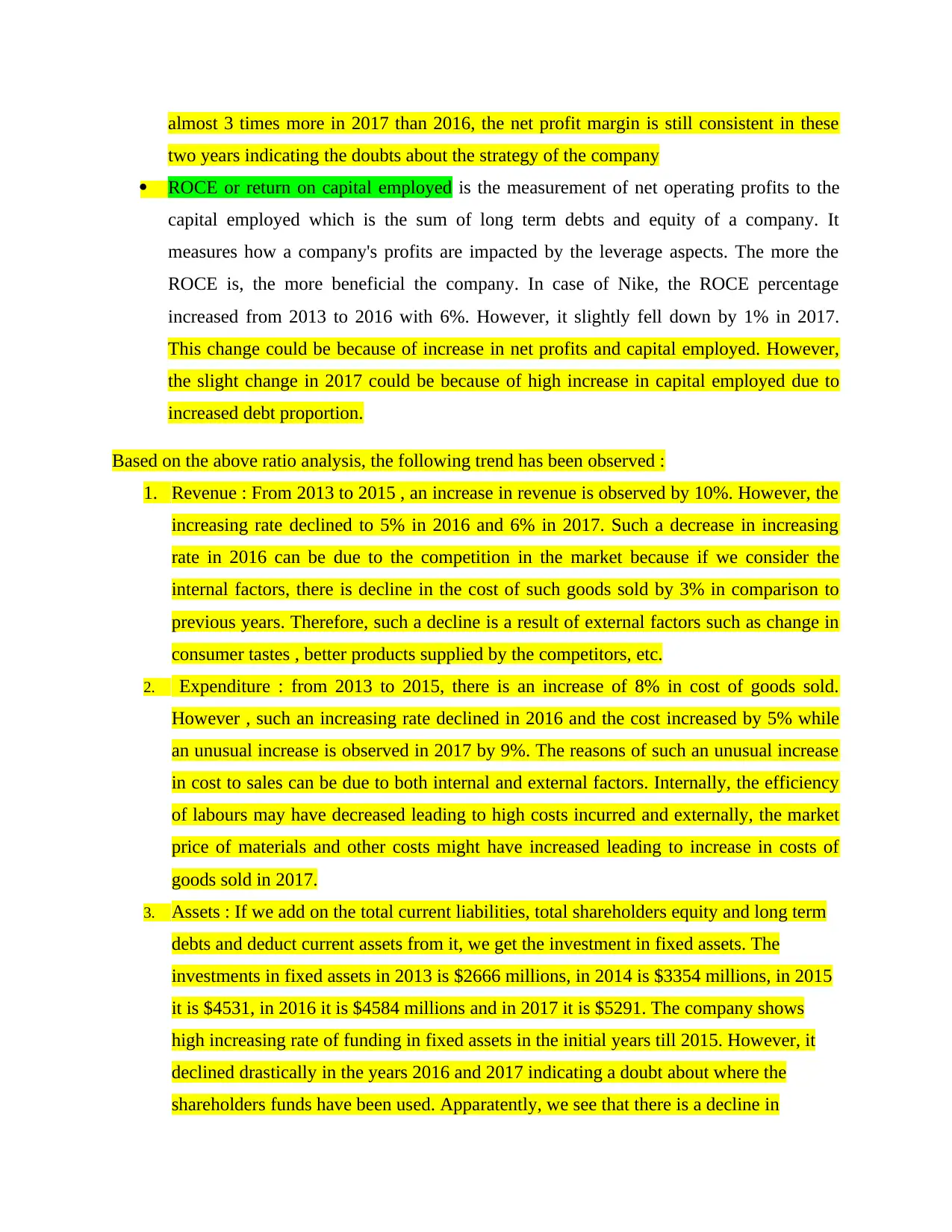
almost 3 times more in 2017 than 2016, the net profit margin is still consistent in these
two years indicating the doubts about the strategy of the company
ROCE or return on capital employed is the measurement of net operating profits to the
capital employed which is the sum of long term debts and equity of a company. It
measures how a company's profits are impacted by the leverage aspects. The more the
ROCE is, the more beneficial the company. In case of Nike, the ROCE percentage
increased from 2013 to 2016 with 6%. However, it slightly fell down by 1% in 2017.
This change could be because of increase in net profits and capital employed. However,
the slight change in 2017 could be because of high increase in capital employed due to
increased debt proportion.
Based on the above ratio analysis, the following trend has been observed :
1. Revenue : From 2013 to 2015 , an increase in revenue is observed by 10%. However, the
increasing rate declined to 5% in 2016 and 6% in 2017. Such a decrease in increasing
rate in 2016 can be due to the competition in the market because if we consider the
internal factors, there is decline in the cost of such goods sold by 3% in comparison to
previous years. Therefore, such a decline is a result of external factors such as change in
consumer tastes , better products supplied by the competitors, etc.
2. Expenditure : from 2013 to 2015, there is an increase of 8% in cost of goods sold.
However , such an increasing rate declined in 2016 and the cost increased by 5% while
an unusual increase is observed in 2017 by 9%. The reasons of such an unusual increase
in cost to sales can be due to both internal and external factors. Internally, the efficiency
of labours may have decreased leading to high costs incurred and externally, the market
price of materials and other costs might have increased leading to increase in costs of
goods sold in 2017.
3. Assets : If we add on the total current liabilities, total shareholders equity and long term
debts and deduct current assets from it, we get the investment in fixed assets. The
investments in fixed assets in 2013 is $2666 millions, in 2014 is $3354 millions, in 2015
it is $4531, in 2016 it is $4584 millions and in 2017 it is $5291. The company shows
high increasing rate of funding in fixed assets in the initial years till 2015. However, it
declined drastically in the years 2016 and 2017 indicating a doubt about where the
shareholders funds have been used. Apparatently, we see that there is a decline in
two years indicating the doubts about the strategy of the company
ROCE or return on capital employed is the measurement of net operating profits to the
capital employed which is the sum of long term debts and equity of a company. It
measures how a company's profits are impacted by the leverage aspects. The more the
ROCE is, the more beneficial the company. In case of Nike, the ROCE percentage
increased from 2013 to 2016 with 6%. However, it slightly fell down by 1% in 2017.
This change could be because of increase in net profits and capital employed. However,
the slight change in 2017 could be because of high increase in capital employed due to
increased debt proportion.
Based on the above ratio analysis, the following trend has been observed :
1. Revenue : From 2013 to 2015 , an increase in revenue is observed by 10%. However, the
increasing rate declined to 5% in 2016 and 6% in 2017. Such a decrease in increasing
rate in 2016 can be due to the competition in the market because if we consider the
internal factors, there is decline in the cost of such goods sold by 3% in comparison to
previous years. Therefore, such a decline is a result of external factors such as change in
consumer tastes , better products supplied by the competitors, etc.
2. Expenditure : from 2013 to 2015, there is an increase of 8% in cost of goods sold.
However , such an increasing rate declined in 2016 and the cost increased by 5% while
an unusual increase is observed in 2017 by 9%. The reasons of such an unusual increase
in cost to sales can be due to both internal and external factors. Internally, the efficiency
of labours may have decreased leading to high costs incurred and externally, the market
price of materials and other costs might have increased leading to increase in costs of
goods sold in 2017.
3. Assets : If we add on the total current liabilities, total shareholders equity and long term
debts and deduct current assets from it, we get the investment in fixed assets. The
investments in fixed assets in 2013 is $2666 millions, in 2014 is $3354 millions, in 2015
it is $4531, in 2016 it is $4584 millions and in 2017 it is $5291. The company shows
high increasing rate of funding in fixed assets in the initial years till 2015. However, it
declined drastically in the years 2016 and 2017 indicating a doubt about where the
shareholders funds have been used. Apparatently, we see that there is a decline in
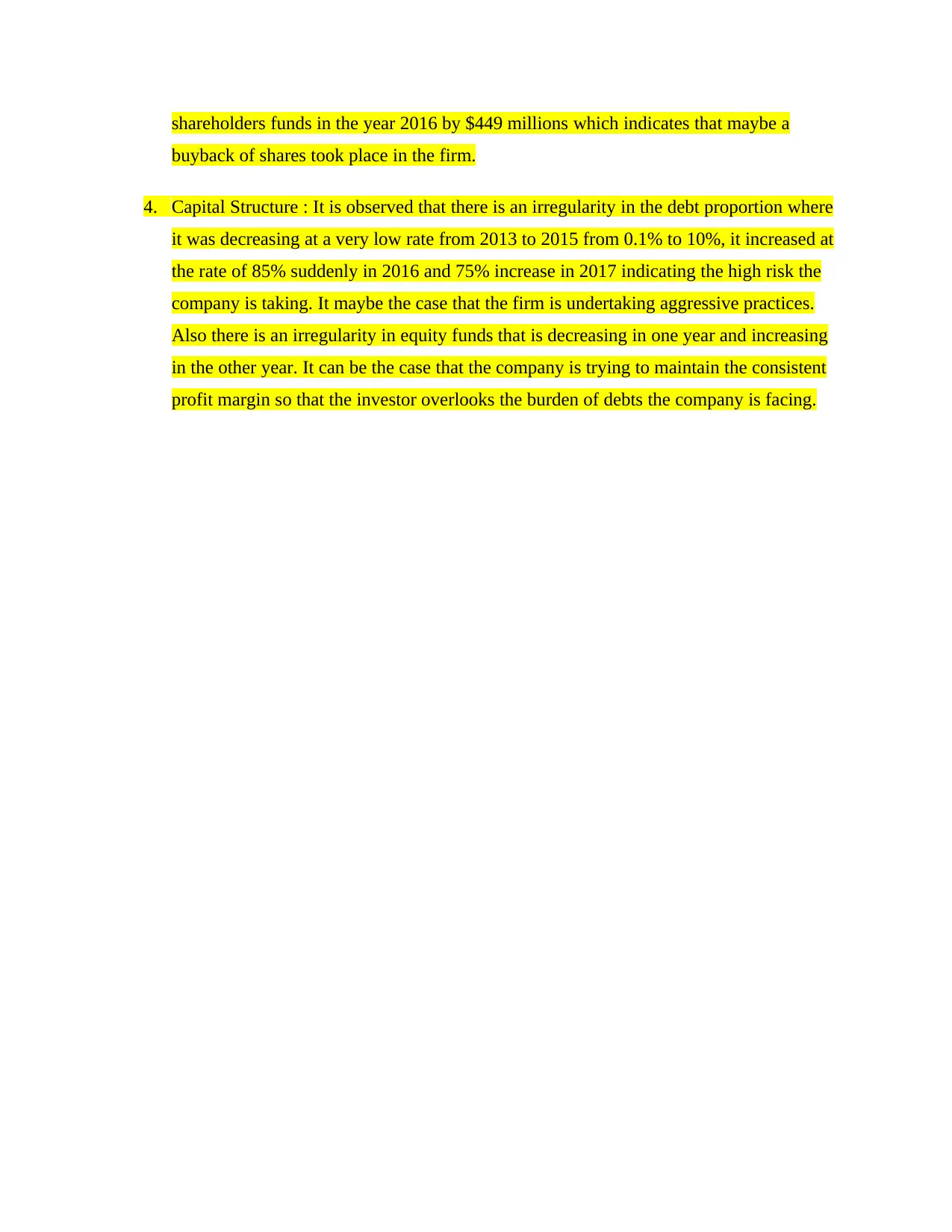
shareholders funds in the year 2016 by $449 millions which indicates that maybe a
buyback of shares took place in the firm.
4. Capital Structure : It is observed that there is an irregularity in the debt proportion where
it was decreasing at a very low rate from 2013 to 2015 from 0.1% to 10%, it increased at
the rate of 85% suddenly in 2016 and 75% increase in 2017 indicating the high risk the
company is taking. It maybe the case that the firm is undertaking aggressive practices.
Also there is an irregularity in equity funds that is decreasing in one year and increasing
in the other year. It can be the case that the company is trying to maintain the consistent
profit margin so that the investor overlooks the burden of debts the company is facing.
buyback of shares took place in the firm.
4. Capital Structure : It is observed that there is an irregularity in the debt proportion where
it was decreasing at a very low rate from 2013 to 2015 from 0.1% to 10%, it increased at
the rate of 85% suddenly in 2016 and 75% increase in 2017 indicating the high risk the
company is taking. It maybe the case that the firm is undertaking aggressive practices.
Also there is an irregularity in equity funds that is decreasing in one year and increasing
in the other year. It can be the case that the company is trying to maintain the consistent
profit margin so that the investor overlooks the burden of debts the company is facing.
⊘ This is a preview!⊘
Do you want full access?
Subscribe today to unlock all pages.

Trusted by 1+ million students worldwide
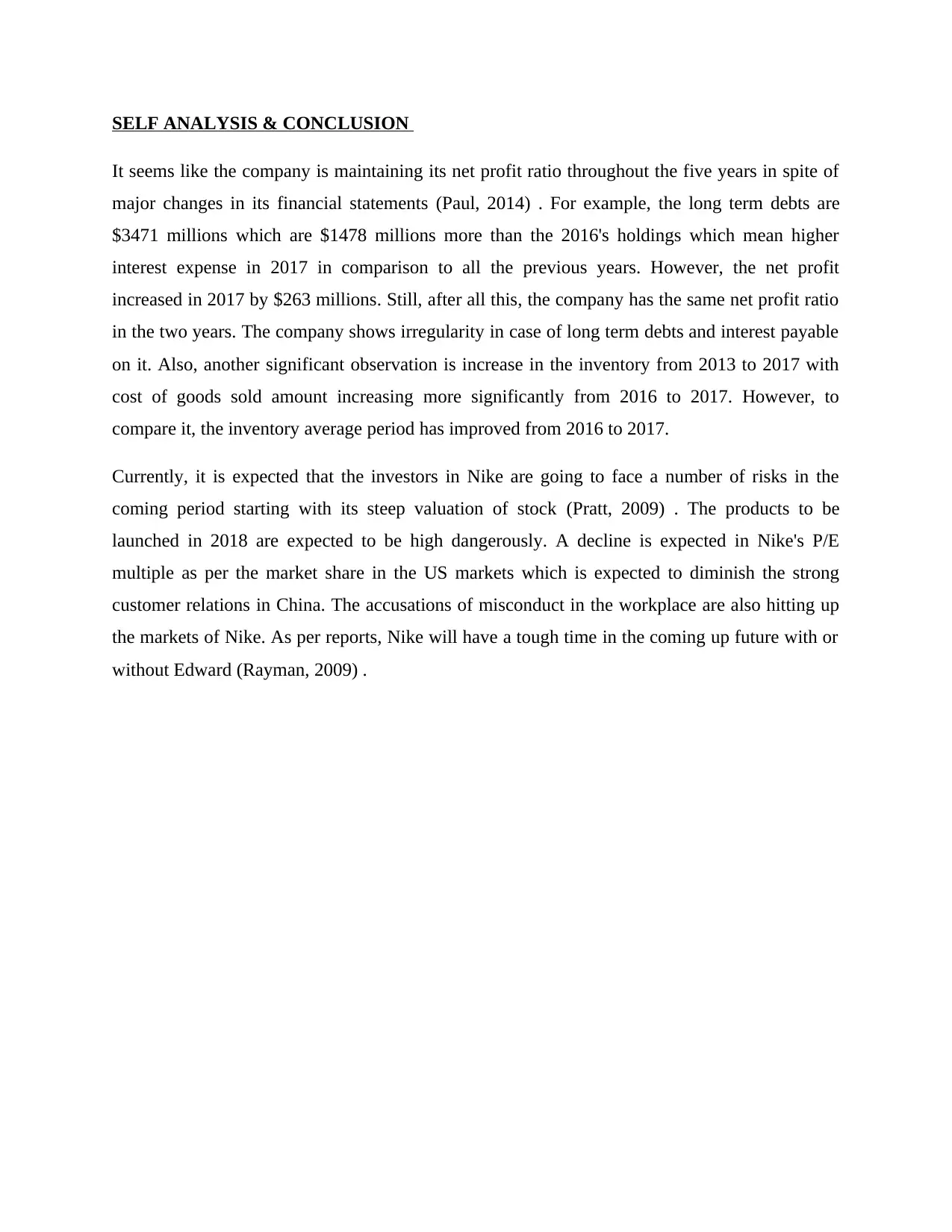
SELF ANALYSIS & CONCLUSION
It seems like the company is maintaining its net profit ratio throughout the five years in spite of
major changes in its financial statements (Paul, 2014) . For example, the long term debts are
$3471 millions which are $1478 millions more than the 2016's holdings which mean higher
interest expense in 2017 in comparison to all the previous years. However, the net profit
increased in 2017 by $263 millions. Still, after all this, the company has the same net profit ratio
in the two years. The company shows irregularity in case of long term debts and interest payable
on it. Also, another significant observation is increase in the inventory from 2013 to 2017 with
cost of goods sold amount increasing more significantly from 2016 to 2017. However, to
compare it, the inventory average period has improved from 2016 to 2017.
Currently, it is expected that the investors in Nike are going to face a number of risks in the
coming period starting with its steep valuation of stock (Pratt, 2009) . The products to be
launched in 2018 are expected to be high dangerously. A decline is expected in Nike's P/E
multiple as per the market share in the US markets which is expected to diminish the strong
customer relations in China. The accusations of misconduct in the workplace are also hitting up
the markets of Nike. As per reports, Nike will have a tough time in the coming up future with or
without Edward (Rayman, 2009) .
It seems like the company is maintaining its net profit ratio throughout the five years in spite of
major changes in its financial statements (Paul, 2014) . For example, the long term debts are
$3471 millions which are $1478 millions more than the 2016's holdings which mean higher
interest expense in 2017 in comparison to all the previous years. However, the net profit
increased in 2017 by $263 millions. Still, after all this, the company has the same net profit ratio
in the two years. The company shows irregularity in case of long term debts and interest payable
on it. Also, another significant observation is increase in the inventory from 2013 to 2017 with
cost of goods sold amount increasing more significantly from 2016 to 2017. However, to
compare it, the inventory average period has improved from 2016 to 2017.
Currently, it is expected that the investors in Nike are going to face a number of risks in the
coming period starting with its steep valuation of stock (Pratt, 2009) . The products to be
launched in 2018 are expected to be high dangerously. A decline is expected in Nike's P/E
multiple as per the market share in the US markets which is expected to diminish the strong
customer relations in China. The accusations of misconduct in the workplace are also hitting up
the markets of Nike. As per reports, Nike will have a tough time in the coming up future with or
without Edward (Rayman, 2009) .
Paraphrase This Document
Need a fresh take? Get an instant paraphrase of this document with our AI Paraphraser
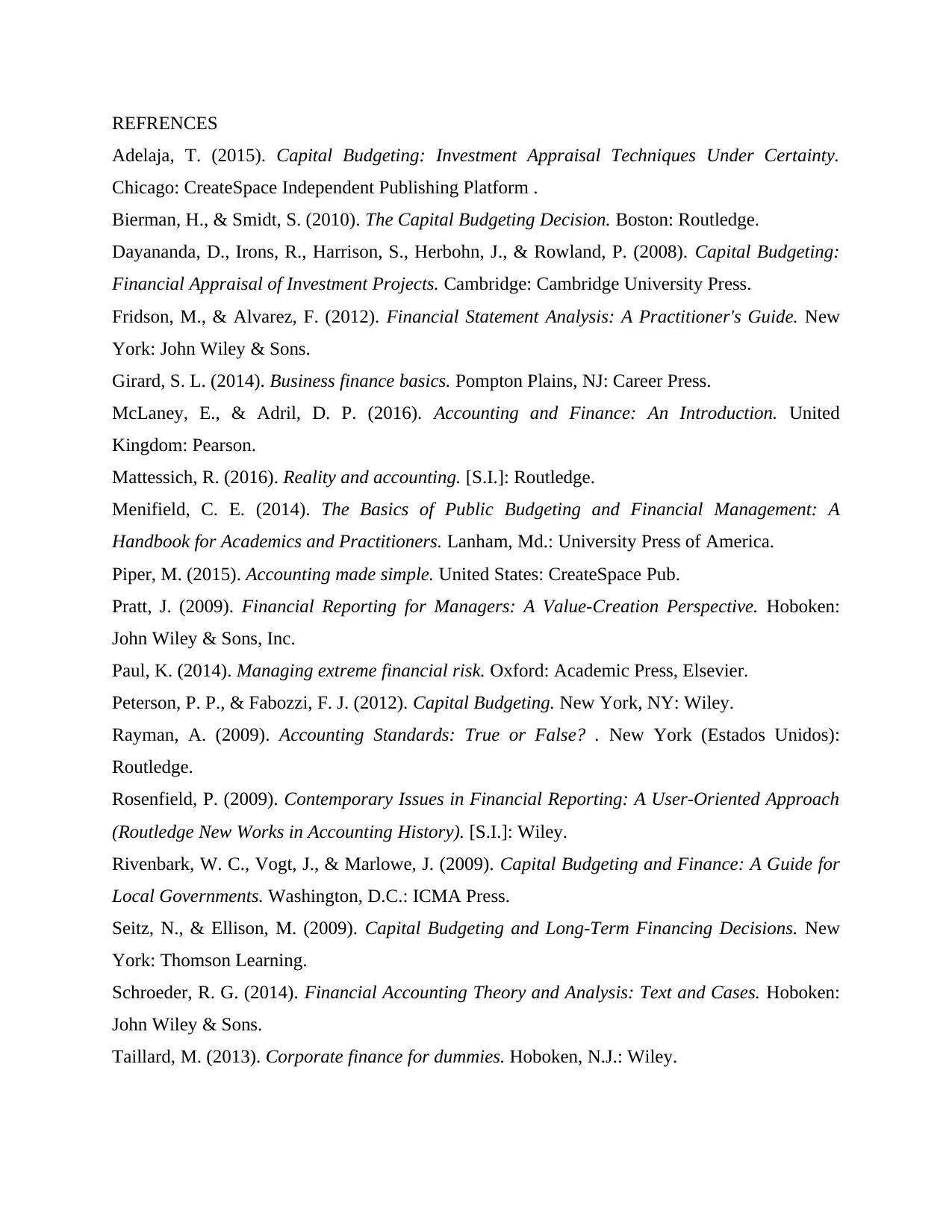
REFRENCES
Adelaja, T. (2015). Capital Budgeting: Investment Appraisal Techniques Under Certainty.
Chicago: CreateSpace Independent Publishing Platform .
Bierman, H., & Smidt, S. (2010). The Capital Budgeting Decision. Boston: Routledge.
Dayananda, D., Irons, R., Harrison, S., Herbohn, J., & Rowland, P. (2008). Capital Budgeting:
Financial Appraisal of Investment Projects. Cambridge: Cambridge University Press.
Fridson, M., & Alvarez, F. (2012). Financial Statement Analysis: A Practitioner's Guide. New
York: John Wiley & Sons.
Girard, S. L. (2014). Business finance basics. Pompton Plains, NJ: Career Press.
McLaney, E., & Adril, D. P. (2016). Accounting and Finance: An Introduction. United
Kingdom: Pearson.
Mattessich, R. (2016). Reality and accounting. [S.I.]: Routledge.
Menifield, C. E. (2014). The Basics of Public Budgeting and Financial Management: A
Handbook for Academics and Practitioners. Lanham, Md.: University Press of America.
Piper, M. (2015). Accounting made simple. United States: CreateSpace Pub.
Pratt, J. (2009). Financial Reporting for Managers: A Value-Creation Perspective. Hoboken:
John Wiley & Sons, Inc.
Paul, K. (2014). Managing extreme financial risk. Oxford: Academic Press, Elsevier.
Peterson, P. P., & Fabozzi, F. J. (2012). Capital Budgeting. New York, NY: Wiley.
Rayman, A. (2009). Accounting Standards: True or False? . New York (Estados Unidos):
Routledge.
Rosenfield, P. (2009). Contemporary Issues in Financial Reporting: A User-Oriented Approach
(Routledge New Works in Accounting History). [S.I.]: Wiley.
Rivenbark, W. C., Vogt, J., & Marlowe, J. (2009). Capital Budgeting and Finance: A Guide for
Local Governments. Washington, D.C.: ICMA Press.
Seitz, N., & Ellison, M. (2009). Capital Budgeting and Long-Term Financing Decisions. New
York: Thomson Learning.
Schroeder, R. G. (2014). Financial Accounting Theory and Analysis: Text and Cases. Hoboken:
John Wiley & Sons.
Taillard, M. (2013). Corporate finance for dummies. Hoboken, N.J.: Wiley.
Adelaja, T. (2015). Capital Budgeting: Investment Appraisal Techniques Under Certainty.
Chicago: CreateSpace Independent Publishing Platform .
Bierman, H., & Smidt, S. (2010). The Capital Budgeting Decision. Boston: Routledge.
Dayananda, D., Irons, R., Harrison, S., Herbohn, J., & Rowland, P. (2008). Capital Budgeting:
Financial Appraisal of Investment Projects. Cambridge: Cambridge University Press.
Fridson, M., & Alvarez, F. (2012). Financial Statement Analysis: A Practitioner's Guide. New
York: John Wiley & Sons.
Girard, S. L. (2014). Business finance basics. Pompton Plains, NJ: Career Press.
McLaney, E., & Adril, D. P. (2016). Accounting and Finance: An Introduction. United
Kingdom: Pearson.
Mattessich, R. (2016). Reality and accounting. [S.I.]: Routledge.
Menifield, C. E. (2014). The Basics of Public Budgeting and Financial Management: A
Handbook for Academics and Practitioners. Lanham, Md.: University Press of America.
Piper, M. (2015). Accounting made simple. United States: CreateSpace Pub.
Pratt, J. (2009). Financial Reporting for Managers: A Value-Creation Perspective. Hoboken:
John Wiley & Sons, Inc.
Paul, K. (2014). Managing extreme financial risk. Oxford: Academic Press, Elsevier.
Peterson, P. P., & Fabozzi, F. J. (2012). Capital Budgeting. New York, NY: Wiley.
Rayman, A. (2009). Accounting Standards: True or False? . New York (Estados Unidos):
Routledge.
Rosenfield, P. (2009). Contemporary Issues in Financial Reporting: A User-Oriented Approach
(Routledge New Works in Accounting History). [S.I.]: Wiley.
Rivenbark, W. C., Vogt, J., & Marlowe, J. (2009). Capital Budgeting and Finance: A Guide for
Local Governments. Washington, D.C.: ICMA Press.
Seitz, N., & Ellison, M. (2009). Capital Budgeting and Long-Term Financing Decisions. New
York: Thomson Learning.
Schroeder, R. G. (2014). Financial Accounting Theory and Analysis: Text and Cases. Hoboken:
John Wiley & Sons.
Taillard, M. (2013). Corporate finance for dummies. Hoboken, N.J.: Wiley.
1 out of 11
Related Documents
Your All-in-One AI-Powered Toolkit for Academic Success.
+13062052269
info@desklib.com
Available 24*7 on WhatsApp / Email
![[object Object]](/_next/static/media/star-bottom.7253800d.svg)
Unlock your academic potential
Copyright © 2020–2026 A2Z Services. All Rights Reserved. Developed and managed by ZUCOL.





